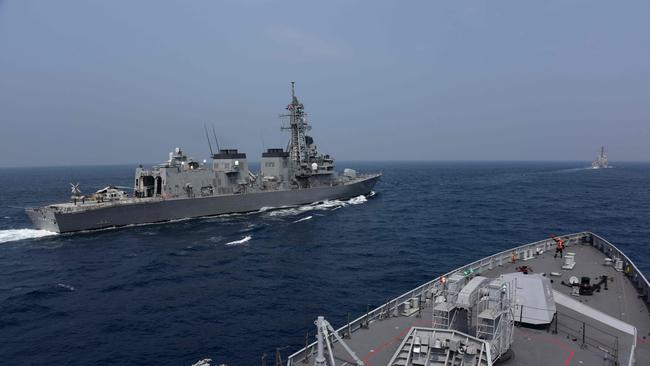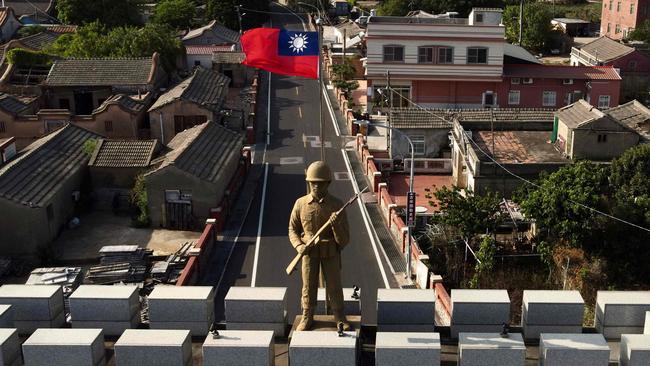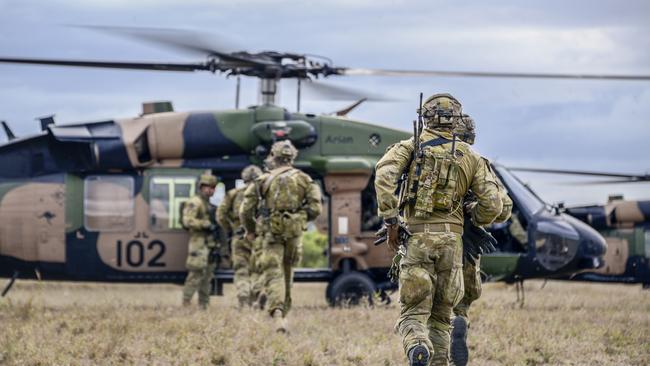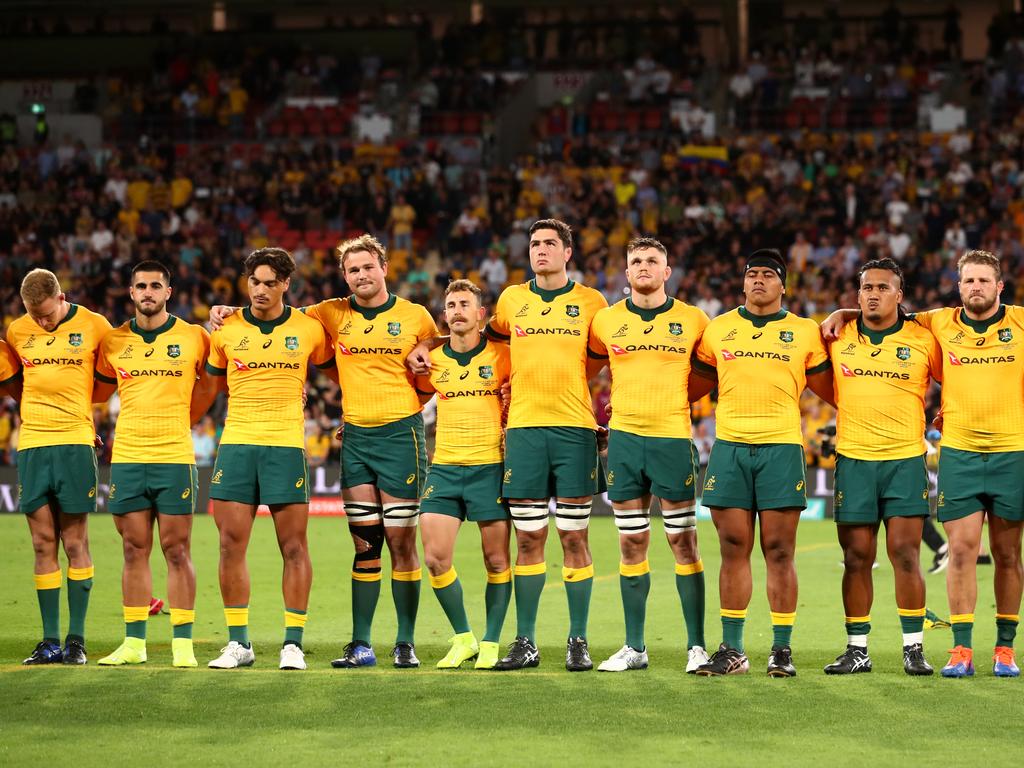The US-Australian alliance is safe but real danger still lies ahead
As Scott Morrison prepares Australia for terrible news, our focus needs to stay locked on to the emerging situation in the Indo-Pacific.

Among America’s allies, Australia was uniquely well placed to benefit from the US election outcome. Whoever became president, Australia would have high standing in the White House and the wider US government.
In ways that are a little mysterious, Australia is immensely popular in the US even though minimal attention is paid to our national affairs, beyond a tiny group in American policymaking circles. The fact is that brand Australia opens many doors in Washington. In the US military and intelligence establishment Australia is well regarded for our willingness to engage at the hard, war-fighting end of operations, for the quality of our military units, our intelligence work and direct, pragmatic diplomacy.
Australia and the US under the Trump administration developed big plans for strengthening the alliance which, post COVID-19, includes reinforcing our supply chains for critical materials, producing “complex munitions” (that is, missiles) in Australia, operating more closely together in the region and, through Quadrilateral Security Dialogue, deepening security engagement with Japan and India.
Had Donald Trump won the election Australia-US co-operation would continue to expand. The same will be true for the Biden administration, although Joe Biden may do more to expand the economic and technological aspects of our partnership. As Scott Morrison quickly pointed out, Biden had close family connections — two uncles who fought in Papua New Guinea in World War II — and many points of engagement with Australia during his time as vice-president to Barack Obama.
The Prime Minister’s early phone call with Biden on Thursday was carefully considered. Rather than just swapping pleasantries about Biden’s win, Morrison invited the president-elect to Australia next year for the 70th anniversary of signing the ANZUS Treaty. That will probably be in August or September — the treaty was signed September 1, 1951 — and should coincide with the annual AUSMIN meeting of Australia’s foreign and defence ministers and their US counterparts.
Morrison is leading with Australia’s key strengths in Washington: our defence, intelligence and security ties. In emphasising our shared values, commitment to the international rule of law and stability in Asia, Morrison is starting a conversation with Biden about a shared approach to dealing with China.
The biggest strategic question next year will be if Biden is sufficiently focused and motivated to push back against the relentless incremental push by China’s President Xi Jinping to dominate Southeast Asia and Taiwan, militarily and economically. Xi’s calculation might be that a distracted and internally riven America might prefer to avoid a costly confrontation.
With China, Trump’s unpredictability was initially a strength, puzzling Beijing. Now Xi seems focused on steadily extending China’s military power against Taiwan and in the South and East China seas below the threshold of provoking a sharp US response.
My assessment is that Taiwan is to the current age what Poland was to Europe in 1939. The US will not allow a coercive Beijing to absorb Taiwan or bully Taipei into accepting a subordinate position under the Chinese Communist Party.
That is an immensely consequential judgment call on which the peace and security of the Asia-Pacific region rests. It is fundamentally important to Australia as well, in a way that gives us a direct stake in Taiwan’s security.
If the US is not motivated to defend the 23 million people of a strong liberal democracy such as Taiwan (a country critically important to the American information technology industry), why should Australia expect any greater US interest in our security?
The strategic risk Biden presents is that he might revert to the disengaged style of the second term Obama administration, which in September 2015, for example, was prepared to accept a duplicitous pledge from Xi that he would not militarise the southern part of the South China Sea and would desist from “state-sponsored cyber intrusions” and widespread intellectual property theft.
On balance it is likelier that Biden will continue a significantly tougher approach to China, an approach that has had bipartisan support in Washington for years and that congress could support, given the likely numbers in the Senate.
Biden may well reach out to Xi, testing whether it is possible for China and the US to mitigate trade tensions. Early engagements are not likely to prosper, though, because there are deeper sources to America’s strategic problems with Beijing, including intellectual property theft, unprecedented levels of cyber and human espionage, China’s undisguised hostile military build-up and the ugly lack-of-charm offensive known as wolf warrior diplomacy.

What is clear since Biden ceased being Obama’s vice-president is that Beijing has substantially burnt its diplomatic bridges with most democracies. Notwithstanding the special pleading we hear in Australia from Beijing’s co-opted elites, the reality is that those democracies capable of thinking strategically realise that China under Xi is the biggest risk we collectively face to our sovereignty and security. Biden will surround himself with the best of the Democratic foreign and defence policy establishment, a group that values the alliance relationship. Look for a line-up including Kurt Campbell as national security adviser and Michele Flournoy as secretary of defence. That would be a highly competent, Asia-savvy team.
When I was deputy secretary for strategy in our Defence Department I negotiated with Flournoy the annual rotations of US marines and enhanced air force presence in northern Australia. We facilitated government agreements for additional intelligence co-operation on “space situational awareness” (that is, tracking objects in space) and bringing cyber security under the framework of the ANZUS Treaty, where the parties agree to “act to meet the common danger” of attacks on either country.
A Washington that is actively interested in doing more with allies does, of course, present some risk as well. What if the Americans start asking us to do more things? How would Canberra react if the next US administration said it wanted to have serious discussions about the defence of Taiwan? The July AUSMIN communique said that “recent events only strengthened their resolve to support Taiwan”. We shouldn’t be surprised if Washington expects some practical consequences to flow from such a statement.
The real policy test for our government after the US presidential election is whether Australia is prepared to do forward and creative thinking with the administration to shape a joint approach to regional security, bringing in other friends and allies. It is high time, for example, that Australia tried to build a consensus with like-minded democracies for a shared response to Chinese economic coercion.
Rather than pretending there is some mystifying case to explore with China about rock lobster contamination or substandard timber, we should be gearing our allies for a united approach to Beijing, saying that trade coercion for political purposes will not be tolerated.
Likewise, Australia needs to act with the urgency called for in the July strategic update, which projects a serious increase in the range and hitting power of the Australian Defence Force.
If we are planning local missile production in Australia and developing weapons capable of hypersonic flight, how far down that track can we get in two years rather than 10? The answer will come only in the context of more alliance co-operation.
Under Biden, Washington’s door is open for Australia to shape what the future of our alliance co-operation will look like.
Washington and Canberra want to focus on the Indo-Pacific and draw down in the Middle East and Afghanistan, but history and strategy will force our countries to stay engaged no matter how reluctantly.
Morrison is preparing Australia for terrible news about the alleged conduct of some special forces troops in Afghanistan. We will see the scope of allegations next week and brace for years of legal action.
This will impact the alliance in several ways. First, we should remember that special force operations in Afghanistan were a combined allied effort. It was also immensely effective, and that shouldn’t be forgotten even as we face the consequences of the bad behaviour of individuals. Who knows where this trail will lead?

Second, looking ahead, co-operation between our special forces and their US counterparts is intense and extraordinarily close. It is a key part of our military strength and deterrence capacity in the Indo-Pacific.
As democracies are facing increased hybrid warfare challenges and so-called grey zone operations just below the level of open conflict, the US cannot afford to be distracted by Trump’s refusal to deny the election outcome and Australia can’t allow its military capabilities to be undermined by years of painful introspection about alleged war crimes in Afghanistan.
Whatever emerges next week, our defence focus needs to stay locked on to the emerging clear and present danger in the Indo-Pacific. Our special forces capability is central to that approach and will need to be strengthened even as they continue a long journey of internal reflection and reform.
Our special forces play a critical role in Southeast Asia by building close relationships with their regional counterparts. This military diplomacy is important: Asian special force organisations are often the elite of their wider militaries and politically connected. Our regional special force links provide access and insights that are critical to the success of Australia’s broader relations with the region.
In Washington, our special force operations in Afghanistan and elsewhere were a major contribution to our alliance credibility. The Biden administration will look to Canberra swiftly to investigate past wrongdoings, deliver justice openly, care for our troops because they deserve the nation’s support, and stay focused on the threats we face.
Peter Jennings is executive director of the Australian Strategic Policy Institute and a former deputy secretary for strategy in the Department of Defence.





To join the conversation, please log in. Don't have an account? Register
Join the conversation, you are commenting as Logout